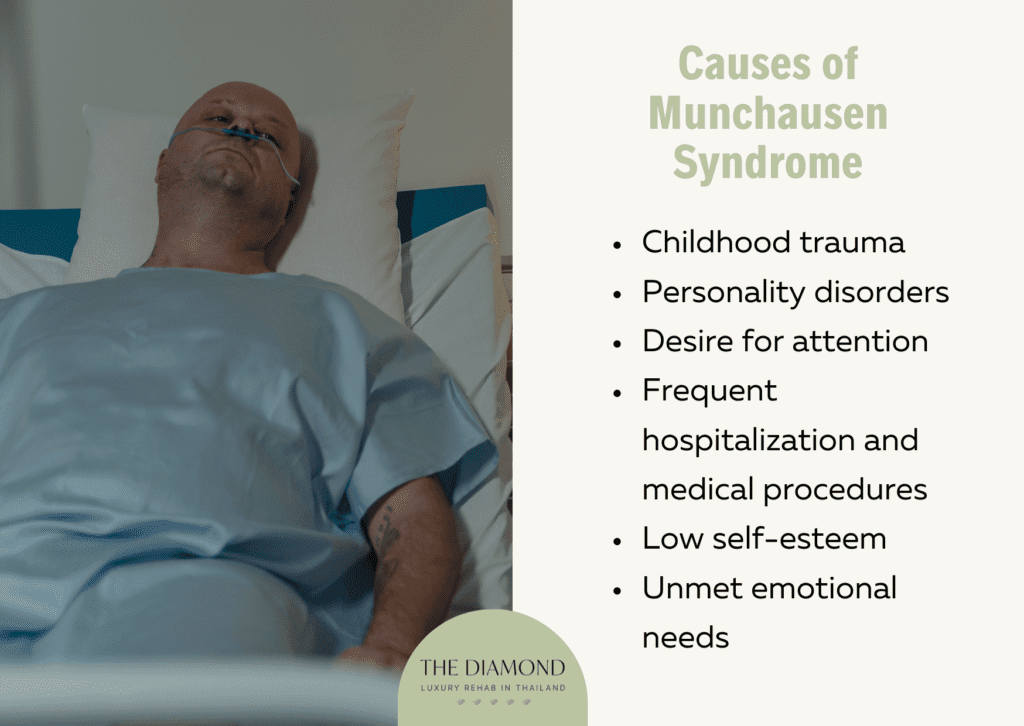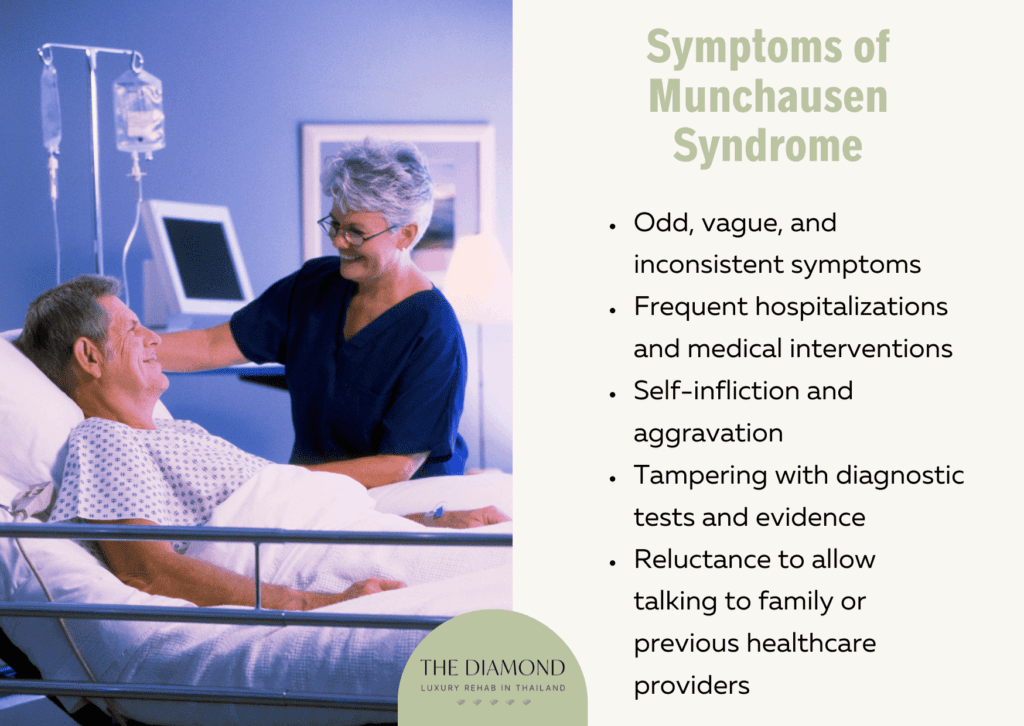Munchausen syndrome: definition, causes, symptoms, and treatments
Table of content
- What is Munchausen syndrome?
- What are the causes of Munchausen syndrome?
- What are the symptoms of Munchausen syndrome?
- Who is affected by Munchausen syndrome?
- What are the risk factors for Munchausen syndrome?
- How is Munchausen syndrome diagnosed?
- What are the treatments for Munchausen syndrome?
- How to prevent Munchausen syndrome?
- What to expect with Munchausen syndrome?
- What is the difference between Munchausen syndrome and Munchausen syndrome by proxy?
- What is the difference between Munchausen syndrome and malingering?

Munchausen syndrome is a mental health disorder in which an individual deliberately feigns or exaggerates physical or psychological symptoms, often with the intent of receiving medical attention or treatment.
The exact causes of Munchausen syndrome are not well understood, but several factors may contribute to its development, including childhood trauma, personality disorders, desire for attention, frequent hospitalization, and medical procedures, low self-esteem, and unmet emotional needs.
The symptoms of Munchausen syndrome are a recurring sequence of odd, vague, and inconsistent complaints, frequent hospitalizations and a penchant for medical interventions, self-infliction or aggravation, tampering with diagnostic tests and evidence, and reluctance to allow talking to family or previous healthcare providers.
The treatment of Munchausen syndrome typically involves a combination of therapeutic approaches, including psychotherapy, cognitive behavioral therapy, family therapy, and, if necessary, medication to address coexisting mental disorders. Treating Munchausen syndrome is complex, as individuals with this condition often exhibit resistance to acknowledging their behavior.
What is Munchausen syndrome?
Munchausen syndrome is a rare psychological disorder during which a person feigns or fabricates physical or psychological symptoms to gain attention, sympathy, or medical treatment.
The term Munchausen syndrome was first coined by Richard Asher in 1951 and named after the 18th-century German aristocrat Karl Friedrich Hieronymus, Baron von Münchhausen, who enthralled audiences with incredible and dramatic tales of impossible feats, often featuring himself as the protagonist.
In the 2014 article “Munchausen Syndrome and Munchausen Syndrome by Proxy in Dermatology”, published in the Journal of the American Academy of Dermatology, A. S. Boyd, et al. outlined that individuals with Munchausen syndrome intentionally harm themselves, often by injecting foreign substances into their bodies, to secure admission to a hospital and receive the attention associated with presenting a condition that is challenging to diagnose.
Experts note that individuals with Munchausen syndrome commonly arrive at hospitals with sudden and often dramatic illnesses, accompanied by a history of multiple hospital admissions. These presentations tend to occur during off-hours, such as late at night and on weekends, when less experienced medical staff may be on duty. They willingly, and sometimes eagerly, subject themselves to extensive and invasive medical procedures and tests, displaying a notable tolerance for pain. Initially, the stories they provide about their medical history are dramatic and plausible but often lack full credibility.
What is Munchausen syndrome called now?

Munchausen syndrome is now called factitious disorder imposed on self (FDIS). The diagnostic terminology changed with the publication of the Diagnostic and Statistical Manual of Mental Disorders, Fifth Edition (DSM-5), which no longer uses the term Munchausen syndrome.
As per 2014 research “Munchausen syndrome: Playing sick or sick player”, published in the Industrial Psychiatry Journal, Munchausen syndrome has also been known by several alternative names, such as hospital addiction syndrome, thick chart syndrome, and hospital hopper syndrome.
Why was Munchausen syndrome renamed?
Munchausen syndrome was renamed to provide a more standardized and clinically useful way of categorizing and diagnosing the condition. According to the American Journal of Psychiatry, 2018 issue, titled “Challenges in Diagnosing Factitious Disorder”, factitious disorder was initially recognized as a diagnostic category in 1980 within the DSM-3. Later, in DSM-4-TR, it was categorized into three main subtypes. Significant changes were made to the criteria for factitious disorder in the DSM-5 to represent the nature of these disorders more accurately.
The disorder is now categorized within the somatic symptoms and related disorders, and the description has changed from “motivation to assume a sick role” to “deceptive behavior is evident in the absence of external incentives”. Moreover, the disorder is now subclassified as “factitious disorder imposed on self” and “factitious disorder imposed on another”.
Is Munchausen syndrome a mental illness?
Yes, Munchausen syndrome is a mental illness because it reflects a severe and distinct psychological condition characterized by intentional deception and manipulation related to medical symptoms. It is typically diagnosed and treated by mental health professionals who are specially trained to diagnose and treat mental illnesses.
Individuals with Munchausen syndrome are primarily motivated by a need for attention, a desire to assume the “sick role,” and often underlying emotional distress, as described in the National Health Service (NHS) 2022 article, titled “Overview – Munchausen syndrome”. These motivations stem from psychological factors, such as a need for validation, control, or a way to cope with unresolved emotional issues.
How common is Munchausen syndrome?
Munchausen syndrome is considered to be a rare condition, with fewer than 1% of patients in clinical settings experiencing it, as reported in the StatPearls 2023 edition and titled “Munchausen Syndrome”. Additionally, a National Hospital Discharge Survey reported an incidence of 6.8 cases of factitious disorder for every 100,000 patients.
The 2018 issue of the American Journal of Psychiatry titled “Challenges in Diagnosing Factitious Disorder” also estimated the lifetime prevalence of FDIS in clinical settings as approximately 1%, while in the general population, it is around 0.1%. Prevalence rates in different studies have shown a wide range, spanning from as low as 0.007% to as high as 8%.
Nevertheless, it is challenging to accurately determine how common Munchausen syndrome is because confirming the diagnosis can be problematic for clinicians, as most patients with suspected Munchausen syndrome tend to deny the diagnosis.
What are the causes of Munchausen syndrome?

The exact causes of Munchausen syndrome are not well discovered, as it is a complex condition influenced by a combination of psychological, environmental, and genetic factors. The potential causes of Munchausen syndrome are listed below.
- Childhood trauma
- Personality disorders
- Desire for attention
- Frequent hospitalization and medical procedures
- Low self-esteem
- Unmet emotional needs
1. Childhood trauma
Childhood trauma refers to adverse experiences or events that occur during a person’s formative years, which can be physically, emotionally, or psychologically distressing. Such trauma may include abuse, neglect, witnessing violence, loss of a loved one, and extensive medical procedures or treatments.
Childhood trauma can contribute to the development of Munchausen syndrome by fostering an environment in which the individual did not receive the necessary emotional support, attention, or care during their early years, growing up with a profound desire for attention and validation.
The 2023 edition of the StatPearls journal on “Factitious disorder” highlighted that the consensus among professionals is that individuals with factitious disorder often have a history of challenging or distressing childhood experiences. An analysis of conversations within online support groups for factitious disorder revealed that among 57 participants, three of them reported positive childhood experiences, while the majority detailed instances of emotional and physical abuse.
2. Personality disorders
Personality disorders encompass a set of ten mental health conditions characterized by enduring, disruptive patterns in thinking, behavior, mood, and interpersonal relationships, as described in the Cleveland Clinic’s 2022 issue titled “Personality Disorders”.
The 2022 issue of National Health Service (NHS), titled “Overview – Munchausen syndrome”, highlighted that personality disorders such as antisocial personality disorder, borderline personality disorder (BPD), and narcissistic personality disorder (NPD) can be connected to Munchausen syndrome.
The article further explained the connection between Munchausen syndrome and personality disorder, suggesting that an individual might have an unstable self-identity and find it challenging to build significant relationships with others. Adopting the “sick role” allows them to take on an identity that comes with support and acceptance from those around them. Additionally, hospital admission also provides the person with a clearly defined position within a social network.
3. Desire for attention
Desire for attention refers to an intense and often pathological need for recognition, care, and sympathy from others. It can lead individuals to simulate or exaggerate physical or psychological symptoms, fabricate illnesses, or induce physical harm to garner the attention and validation they seek.
As per the BetterHealth 2022 issue titled “Munchausen syndrome”, individuals with this condition do not feign illness to get medication or money, instead, their actions are motivated by intricate psychological factors such as a profound need for attention and compassion.
4. Frequent hospitalization and medical procedures

Frequent hospitalization and medical procedures refer to a pattern in which an individual repeatedly seeks medical care, often resulting in numerous hospital admissions and diagnostic tests despite a lack of genuine medical need.
Individuals affected by Munchausen syndrome find a deep sense of satisfaction and fulfillment from assuming the sick role. They may intentionally fabricate or exaggerate symptoms, leading to frequent hospital visits and medical attention, where they receive care, sympathy, and concern from healthcare providers and loved ones.
These individuals may continue to simulate illnesses or injuries, willingly subject themselves to painful or life-threatening surgeries to find profound emotional reward in the care and attention they receive each time they are hospitalized.
The 2022 article of the National Health Service (NHS), titled “Overview – Munchausen syndrome”, pointed out that people suffering from Munchausen syndrome may spend years in a continuous cycle of traveling from one hospital to another, where they feign a diverse array of illnesses. As soon as their deception is exposed, they often swiftly leave the hospital and go to a new one.
5. Low self-esteem
Low self-esteem is a psychological condition characterized by a negative self-perception and a lack of confidence in one’s abilities, worth, or value. Low self-esteem may contribute to the Munchausen syndrome by driving individuals to seek validation and attention through feigning illness. They may use fabricated medical procedures and symptoms to get sympathy and care, ultimately bolstering their self-esteem by assuming the “sick role” and receiving attention from medical professionals.
A 2023 article in one of the Koru publications, ‘What is Munchausen Syndrome? What Causes It?”, mentioned that poor self-image and self-esteem can lead individuals to pursue validation and compassion by fabricating illnesses or injuries. As the condition advances, the fabricated symptoms escalate, requiring more extensive medical intervention and care. To sustain the desired attention and gain self-worth, individuals with Munchausen syndrome may go even further subjecting themselves to unnecessary surgeries or treatments.
6. Unmet emotional needs
Unmet emotional needs refer to the lack of emotional fulfillment, support, or validation in a person’s life. Unmet emotional needs can contribute to the development of Munchausen syndrome disorder, as individuals who do not receive the emotional support and validation they need, may seek to fulfill these needs through fabricated illnesses, which garner attention and care from healthcare providers.
Sinha A. and Smolik T. suggested in the 2021 study “Striving to Die: Medical, Legal, and Ethical Dilemmas Behind Factitious Disorder”, that feigning illness allows individuals with Munchausen syndrome to adopt the “sick role” and receive support and care they lack in other aspects of their life, establish their identity, maintain connections with others, and manage emotional turmoil resulting from unmet needs. Thus, Munchausen syndrome can be viewed as a maladaptive coping mechanism for unmet emotional needs.
What are the symptoms of Munchausen syndrome?

The symptoms of Munchausen syndrome primarily revolve around a pattern of deceptive behavior related to feigning or exaggerating physical or psychological symptoms. The symptoms of Munchausen syndrome are listed below.
- Odd, vague, and inconsistent symptoms
- Frequent hospitalizations and medical interventions
- Self-infliction and aggravation
- Tampering with diagnostic tests and evidence
- Reluctance to allow talking to family or previous healthcare providers
1. Odd, vague, and inconsistent symptoms
Odd, vague, and inconsistent symptoms refer to unusual or poorly defined physical or psychological complaints that lack clarity and consistency. Normally, individuals with Munchausen syndrome come to healthcare providers with complaints that are difficult to pinpoint, diagnose, or treat, and they can vary over time or from one healthcare encounter to another. Such behavior is a characteristic of Munchausen syndrome, as individuals intentionally fabricate or exaggerate these symptoms to gain medical attention, reinforcing their need for care and validation.
A recent 2022 NHS article about “Signs and symptoms – Munchausen syndrome” emphasized that individuals with Munchausen syndrome typically present symptoms that are vague and inconsistent, or describe a sequence of symptoms that resemble typical examples of specific health conditions. Additionally, the article underscored that these individuals share elaborate and often unbelievable personal stories, such as claiming heroic military achievements or asserting considerable wealth and power within the family.
2. Frequent hospitalizations and medical interventions
Frequent hospitalizations and medical interventions refer to the repeated admissions to healthcare facilities and unnecessary medical procedures or treatments that individuals with Munchausen syndrome seek. These actions are symptoms of the syndrome because they exemplify the individual’s insatiable need for medical attention and validation, even when there is no legitimate medical need.
Patients with Munchausen syndrome intentionally create or exaggerate symptoms to generate opportunities for hospitalization and medical interventions, which they perceive as a way to fulfill their emotional needs and desire to maintain the “sick role” for attention and care.
The 2016 article by General Hospital Psychiatry, titled “Factitious disorder: a systematic review of 455 cases in the professional literature”, mentioned an extreme example of one patient from the Robertson and Hossain study, who admitted to undergoing 42 surgical procedures during 850 hospital admissions in 650 different hospitals.
3. Self-infliction and aggravation
Self-infliction and aggravation are symptoms of Munchausen syndrome characterized by the intentional creation or worsening of physical or psychological symptoms. Individuals with this disorder may engage in self-infliction by causing harm to themselves, such as cutting or ingesting harmful substances, to produce symptoms that mimic genuine medical conditions.
Aggravation involves exaggerating existing symptoms or manipulating medical tests and procedures to make the symptoms appear more severe than they actually are. These behaviors are driven by a compulsive need for medical attention and the validation that comes with it, which is a hallmark of Munchausen syndrome.
The 2021 article published in General Hospital Psychiatry, titled “Factitious disorder: a systematic review of 455 cases in the professional literature”, encompasses various examples of such behaviors. Particularly, the study pointed out that the specific techniques employed by individuals with Munchausen syndrome depend on the type of condition they intend to simulate.
For instance, if a patient with this disorder is trying to fake a urological problem, he may falsely report urinary discomfort, mimic acute anuria by withholding urine, simulate hematuria by adding blood to urine samples, or even induce a urinary tract infection through self-injection with bacterial cultures. Patients simulating dermatological issues may create lesions through self-mutilation or by using other means.
Often, these individuals employ multiple methods simultaneously, resulting in diverse symptomatology. The readily available medical information on the internet allows patients without healthcare backgrounds to present complex medical problems, making it challenging to accurately diagnose Munchausen syndrome.
4. Tampering with diagnostic tests and evidence

Tampering with diagnostic tests and evidence refers to the deliberate manipulation or alteration of medical tests to deceive healthcare professionals.
Cleveland Clinic’s 2020 publication, titled “Munchausen Syndrome (Factitious disorder imposed on self)”, underscores the gravity of this condition, where patients may intentionally exaggerate or fabricate symptoms, self-inflict harm to induce symptoms or manipulate diagnostic tests. This can include contaminating a urine sample, adding blood to their urine, self-injecting feces, contaminating IV lines with dirt, or applying tight rubber bands to their limbs. They might also feign swallowing medications, holding them in their cheeks, and later spitting them out.
This tampering is done to sustain the illusion of medical need and satisfy their desire for attention and medical care, which are core features of Munchausen syndrome.
5. Reluctance to allow talking to family or previous healthcare providers
Reluctance to allow talking to family or previous healthcare providers reflects an individual’s resistance to discussions or communication with their family members or prior healthcare providers about their medical history, symptoms, or treatment.
This reluctance serves to maintain their deceptive behavior and the false image they have created. Individuals with Munchausen syndrome often avoid such interactions to prevent their deceit from being uncovered, as disclosing the truth to family or previous healthcare providers may expose their pattern of feigning.
As a result, individuals with Munchausen syndrome frequently switch healthcare providers (a behavior known as “doctor shopping”) to disrupt the continuity of care, as described in the 2018 issue of the American Journal of Psychiatry, titled “Challenges in Diagnosing Factitious Disorder”.
Who is affected by Munchausen syndrome?
Munchausen syndrome usually affects women, typically in the age range of 20 to 40 years, many of whom have a background in healthcare. It can also affect unmarried white men, often in the age group of 30 to 50 years, as claimed by the National Health Service (NHS) 2022 issue titled “Overview – Munchausen syndrome”. The reasons behind the prevalence of these two groups in Munchausen syndrome cases remain unclear.
Nevertheless, the 2023 StatPearls article on “Munchausen Syndrome” also noted that females, unmarried individuals, and those working in the healthcare environment have a higher susceptibility to experiencing or developing the disorder.
What are the risk factors for Munchausen syndrome?
The risk factors for Munchausen syndrome are not well-defined, as the exact causes of this disorder remain elusive. The potential risk factors for Munchausen syndrome are listed below.
- History of early trauma or abuse: Individuals who have experienced early trauma, loss, or abuse may be at greater risk of developing Munchausen syndrome due to the emotional distress associated with such experiences.
- Parental failures: Childhood experiences of inadequate parenting causing anxiety and distress can drive the need for attention through feigning illness.
- Marital difficulties or relationship problems: Turbulent family dynamics or marital problems can lead to emotional turmoil, making an individual more susceptible to seeking attention via fabricated illnesses.
- Chronic illness during childhood: Personal experiences with chronic illness during childhood can influence a person’s perception of illness and medical environments, potentially contributing to Munchausen syndrome.
- Chronic illness of a close family member when the person was a child: Similar to personal childhood illness, a family member’s chronic illness during childhood can shape an individual’s attitudes and behaviors toward healthcare.
- Ability to lie and manipulate: Proficiency in lying and manipulation is a key characteristic of those with Munchausen syndrome, allowing them to maintain their deceptive actions.
- The need to blame personal failures on external factors: The attribution of personal failures to external causes may create a psychological environment where individuals seek external validation and support to cope with their perceived shortcomings. Feigning illness can provide a way to shift the focus away from their personal failures and redirect it toward receiving attention, care, and sympathy from others.
- Underlying psychological issues: The presence of underlying psychological conditions, such as personality disorders, depression, hallucinations, or post-traumatic stress disorder (PTSD) may contribute to the development of Munchausen syndrome.
- Desire for attention: A strong need for attention and validation can make some individuals more susceptible to engaging in factitious behavior.
How is Munchausen syndrome diagnosed?

Munchausen syndrome is diagnosed through a comprehensive psychiatric evaluation conducted by mental health professionals, typically in collaboration with medical specialists. A diagnosis is based on specific criteria outlined in the Diagnostic and Statistical Manual of Mental Disorders (DSM-5).
The DSM-5 outlines precise criteria for factitious disorder imposed on self, which include the deliberate falsification of physical or psychological signs or symptoms, or the induction of injury or disease through deception. Individuals with this disorder present themselves to others as ill, impaired, or injured. Notably, the deceptive behavior persists even without apparent external rewards. Furthermore, the behavior cannot be more effectively explained by another mental disorder, like delusional disorder or other psychotic conditions.
As per Cleveland Clinic’s 2020 article, titled “Munchausen Syndrome (Factitious disorder imposed on self)”, the diagnostic process can be challenging due to the presence of deception and the involvement of multiple healthcare providers. Healthcare professionals typically engage in a process of ruling out potential physical and mental health conditions, often employing a range of diagnostic tests and procedures before considering a diagnosis of this syndrome.
When does Munchausen syndrome occur?
Munchausen syndrome typically occurs during the initial year of adulthood, often following a prior hospitalization for a general medical ailment or another mental disorder, as claimed in the 2017 study “Munchausen syndrome and Munchausen syndrome by proxy: a narrative review” published in the Einstein (Sao Paulo) journal.
The syndrome can persist for years because individuals continue to use deceptive behavior to fulfill their emotional needs. This behavior often begins when individuals face emotional or psychological distress and resort to fabricating or exaggerating illness symptoms as a means to cope or seek attention.
What are the treatments for Munchausen syndrome?
The treatments for Munchausen syndrome are listed below.
- Psychotherapy (talk therapy)
- Cognitive behavioral therapy (CBT)
- Family therapy
- Medication
- Treatment of coexisting mental disorders
1. Psychotherapy (talk therapy)
Psychotherapy, commonly known as talk therapy, is a type of counseling that involves conversations between a trained mental health professional and an individual or a group. It aims to explore and address emotional and psychological issues, improve mental well-being, and develop coping strategies.
In a 2014 case study titled “Munchausen syndrome: Playing sick or sick player”, highlighted in the Indian Journal of Psychiatry, a 19-year-old housewife, who had been married at 17 into a joint family, was referred by a medical specialist due to multiple hospital admissions following complaints of pink-colored vomit, tears, and sweat for two years, with no organic cause detected.
Psychotherapy was used to improve her ability to cope positively with emotional challenges and to enhance her interpersonal relationships. It also helped diminish the perceived benefits associated with adopting the “sick role” and encouraged her to engage in socially acceptable and positive behaviors.
2. Cognitive behavioral therapy (CBT)

Cognitive-behavioral therapy is a psychotherapeutic approach that focuses on helping individuals identify and modify negative thought patterns and behaviors.
Certain sources, including the MSD Manual; Consumer version’s 2022 issue titled “Factitious Disorder Imposed on Self”, suggested that cognitive-behavioral therapy can offer assistance by concentrating on modifying the individual’s thoughts and behaviors. Additionally, this approach can assist individuals with Munchausen syndrome to recognize and address the fundamental issues contributing to the disorder.
3. Family therapy
Family therapy, also known as family counseling, is a therapeutic approach that involves working with individuals and their families to address and resolve emotional and psychological issues within the family system.
According to the 2021 verywellmind article “What Is Munchausen Syndrome (Factitious Disorder Imposed on Self)?”, instructing family members on appropriate responses to someone diagnosed with Munchausen syndrome could be beneficial. The therapist can educate family members not to inadvertently encourage or support the behaviors of the individual with the disorder. This approach might reduce the person’s inclination to feign illness, as they may no longer receive the attention they once desperately needed.
4. Medication
Medications are generally not a primary treatment for Munchausen syndrome, as this disorder is primarily related to behavior and psychological factors. However, medications may be considered in cases where individuals with Munchausen syndrome have coexisting mental health conditions, such as depression, anxiety, or other mood disorders.
In such cases, medication may be prescribed to alleviate these comorbid conditions. However, they should be closely supervised in individuals with this disorder due to the possibility of these drugs being abused, as suggested in the BetterHealth 2022 article titled “Munchausen syndrome”.
5. Treatment of coexisting mental disorders
Treatment of coexisting mental disorders refers to the management and care provided for individuals who have multiple mental health conditions concurrently. In the context of Munchausen syndrome, coexisting mental disorders include conditions like depression, anxiety, or personality disorders.
As mentioned in the previous paragraph, when people with Munchausen syndrome have coexisting mental health conditions, medications may be prescribed to treat them. Even though the medications do not directly address the core issue of factitious behavior in Munchausen syndrome, they can address the emotional and psychological factors that contribute to the development and maintenance of Munchausen syndrome.
How to prevent Munchausen syndrome?
Preventing Munchausen syndrome involves creating an environment of emotional support and awareness, encouraging open communication with loved ones, and being vigilant for signs of excessive and unexplained health issues. Healthy relationships and emotional support from family and friends are also essential preventive factors.
As per the article published in the American Journal of Psychiatry 2018 issue, titled “Challenges in Diagnosing Factitious Disorder”, approaches to managing individuals with factitious disorders include exploring the patient’s reported symptoms in a non-confrontational manner. Expressing a lack of interest in the fabricating behaviors while maintaining genuine care for the patient can enhance the therapeutic relationship and discourage the practice of seeking multiple healthcare providers. Additionally, medical research suggests that increasing the frequency of follow-up appointments can help reduce instances of self-inflicted harm or deceptive behavior.
What to expect with Munchausen syndrome?

One should expect to see a consistent pattern of deceptive behavior related to health issues, frequent hospitalizations, and unnecessary medical procedures in individuals with Munchausen syndrome. Individuals with Munchausen syndrome often possess an extensive knowledge of medical terminology and may exhibit a willingness to endure invasive tests.
These individuals often fabricate symptoms that are challenging to confirm, such as having severe headaches, simulating a seizure, or feigning loss of consciousness. They may even manipulate test results, for instance, heat thermometers to indicate a fever or add blood into urine samples, as exemplified in a 2023 NHS 24 article, titled “Munchausen’s syndrome”.
What are the complications of Munchausen syndrome?
The complications of Munchausen syndrome are adverse reactions resulting from the misuse or overdose of prescription medications, the complexities associated with self-inflicted harm or practices that may lead to poisoning, and the potential for complications arising from unnecessary medical procedures or surgeries, as highlighted in the BetterHealth 2022 issue titled “Munchausen syndrome”. In severe cases, the syndrome can culminate in self-inflicted harm or life-threatening complications stemming from excessive medical intervention.
What is the difference between Munchausen syndrome and Munchausen syndrome by proxy?
The difference between Munchausen syndrome and Munchausen syndrome by proxy (MSBP) lies in the target and dynamics of the deceptive behavior.
Munchausen syndrome involves the deliberate and persistent feigning or exaggeration of one’s own physical or mental illness symptoms. When this deceptive behavior is directed towards another individual, typically a child, it is known as Munchausen syndrome by proxy, according to the 2022 article of Psych Central “Falsifying an Illness: What Is Munchausen Syndrome by Proxy?”.
What is the difference between Munchausen syndrome and malingering?
The difference between Munchausen syndrome and malingering is in the underlying motives and the primary focus of the factitious behavior. In Munchausen syndrome, individuals feign or induce illness symptoms intending to receive attention, sympathy, or medical care, driven by emotional needs and a desire for the “sick role.”
In contrast, when the fabrication of a medical condition is motivated by the prospect of receiving rewards, such as financial compensation, seeking fame, or evading legal consequences, it is indicative of malingering, as defined by the DSM-5. Notably, malingering prioritizes personal advantage rather than seeking medical treatment, as pointed out in the 2022 article of Psych Central “Falsifying an Illness: What Is Munchausen Syndrome by Proxy?”.


